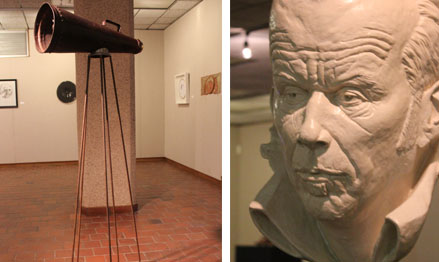Latest News Archive
Please select Category, Year, and then Month to display items
12 January 2024
|
Story Nonsindiswe Qwabe
|
Photo Sonia Small
 Since joining the UFS in 2008, Dr Grey Magaiza has worked extensively on approaches that can foster the socio-economic transformation of societies.
Since joining the UFS in 2008, Dr Grey Magaiza has worked extensively on approaches that can foster the socio-economic transformation of societies.
“The future should be one where communities can decide on their development agenda and futures. That’s the most important for me.” Dr Grey Magaiza, Deputy Director of the Centre for Gender and Africa Studies (CGAS) and Head of the Community Development programme on the Qwaqwa Campus, is passionate about capacitating communities to be agents of change and advancement. His vision for the future emphasises the empowerment of communities to take charge of their development by actively participating in decision making and the implementation of development projects that can improve their lives.
Since joining the UFS in 2008, Dr Magaiza has worked extensively on approaches that can foster the socio-economic transformation of societies. Over the years, he has crafted his research speciality into one that he is most proud of – being an interdisciplinary scientist immersed in the development of communities.
“I’m in a fortunate position of researching what I like. I say ‘fortunate’, because I’ve taken the time to understand what I’m passionate about, which is the overall field of rural livelihoods and livelihood futures – in short, community development. My research starts from an engaged university, understanding the elements that a university must use to enhance transformation and relevance to its immediate community in terms of development.”
One of the ways he has done this is by looking at social entrepreneurship as a development approach for young people in a rural setting. Through workshops with non-profit and civic organisations in Qwaqwa, Dr Magaiza has been helping these organisations to map out their needs and actively meet them through the involvement and support of external role players.
“We understand that communities are part of the national development agenda, but even that national agenda respects community knowledge and intentions and allows communities to shape their identity. A critical enabler of this is community organising. You bring back the capacity in communities to have dialogues on issues affecting them as spaces for engagement, knowledge exchange, and for people to just talk about their way forward.”
By enabling communities to define their development agenda, they can address their specific needs, challenges, and aspirations, he said. “When I look at livelihood futures, it’s quite an exciting aspect of my work – it’s like looking into a fortune tellers’ globe, because you’re not deciding for communities what they should do, but the communities themselves take those decisions.”
Paying homage to a music maestro
2013-10-08
|
 |
08 October 2013
Photo: Supplied |
American singer, songwriter, composer and actor, Thomas Alan Waits (1949–), has been a major inspiration to artists, musicians, poets, writers and thinkers for almost 40 years. He is considered as one of the godfathers of grunge and poetic rock and is a master of contemporary narrative –able to weave emotion and intrigue into his stories of urban grit and rural abandonment. His sometimes jaundiced view of the underbelly of society serves as a rich source of visual imagery.
The Johannes Stegmann Art Gallery is celebrating this vanguard with the exhibition Tom Waits for No Man.
Gordon Froud, artist and senior lecturer at the Department of Visual Arts at the University of Johannesburg (UJ), curated and toured with the Leonard Cohen exhibition entitled Altered Piecesin 2011 and 2012. Due to the success of that exhibition, Froud decided to extend his curative activities in the direction of Tom Waits.
This exhibition is based on a roughly LP-sized circular format (30cm in diameter). Most works hang on the wall, but some artists that preferredto work in 3D, made use of the disc as a base or platform on which to build. There was no restriction on materials or approach. There was no process in selection of songs and each artist was free to use whichever lyric or section of lyrics that they choose (even if someone else had selected this too – artists seldom come up with the same solutions).
The exhibition was launched at the ABSA KKNK in April 2013 and has travelled to the UJ Art Gallery and Grande Provence Wine Estate for the Literary Festival.
The exhibition is on display at the Johannes Stegmann Art Gallery until 25 October 2013.
Gallery hours: 08:30 – 16:30, Monday – Friday
Enquiries: +27(0)51 401 2706 | dejesusav@ufs.ac.za